During cold and flu season, you are likely to come down with a sore throat, cough, and nasal congestion. People will run to the store to use over the counter products that may not work or could even prolong their cold symptoms. Unfortunately, there is no cure for the common cold. But many who suffer from winter illnesses aren’t aware of how effective natural options can be! Although there are some great natural options for natural relief in regard to a cough or cold, today I’m going to focus on essential oils for a cough, cold, or congestion.
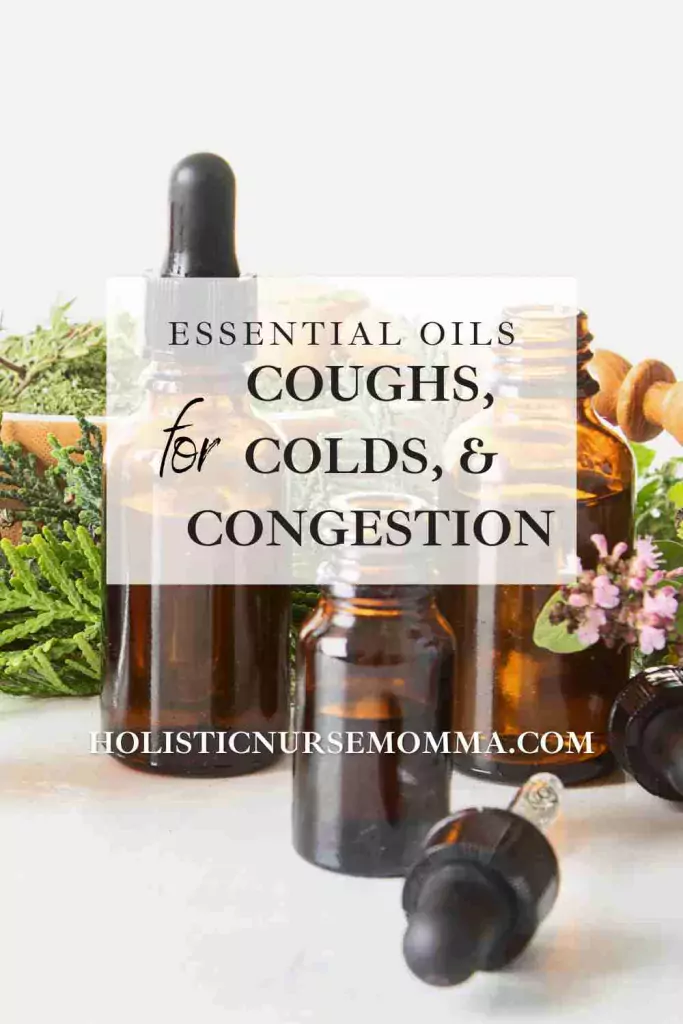
benefits of essential oils
While the use of essential oils for respiratory health has been a traditional practice, it’s worth exploring the scientific basis behind their effectiveness. Essential oils are concentrated extracts derived from plants, each possessing unique compounds that contribute to their therapeutic properties. When it comes to managing coughs, colds, and congestion, several essential oils have demonstrated scientifically-supported benefits.
By understanding the scientific basis of essential oils, you can make informed choices when incorporating them into your wellness routine. These natural remedies have roots in tradition with scientific evidence and provide a holistic approach to managing coughs, colds, and congestion.
1. Antimicrobial Properties:
- Many essential oils, such as oregano and tea tree oil, exhibit potent antimicrobial properties. These properties can aid in fighting off bacteria and viruses that contribute to respiratory infections. Research suggests that these oils may help inhibit the growth of pathogens, providing a natural defense against common cold and cough triggers.
2. Anti-Inflammatory Properties:
- Inflammation is a common response during respiratory infections, leading to symptoms like a stuffy nose. Essential oils like eucalyptus oil and rosemary oil contain anti-inflammatory compounds that may help reduce inflammation in the respiratory tract. By calming inflammation, these oils help to make breathing more comfortable.
3. Expectorant Action:
- Eucalyptus and peppermint oils are known for their expectorant properties, aiding in the removal of mucus from the airways. These oils can help break down and loosen mucus, making it easier to cough up when you have chest congestion. Scientific studies highlight the potential of these essential oils to promote respiratory comfort by helping the body get rid of mucus.
4. Immune System Support:
- Lemon oil and eucalyptus oil have been studied for their immune-supporting effects. Lemon essential oil, in particular, has been associated with stimulating the immune system. Incorporating these oils into your day to day routine may provide an added layer of defense against colds and coughs by supporting your body’s natural immune response.
5. Inhalation Therapy:
- Aromatherapy, meaning when you breath or ‘smell’ essential oils, has been recognized for its positive impact on respiratory issues. Inhaling essential oil vapors can directly affect the respiratory system, offering relief from congestion and promoting clearer airways. Scientific studies on aromatherapy highlight its potential to improve overall well-being, making it a complementary approach to managing respiratory problems. You can do this by opening the bottle and smelling it, using an aromatherapy diffuser, or steam inhalation, where you put essential oils in a bowl of hot water and breath them in (just make sure the steam isn’t too hot for your face and nose!)
Safety Considerations:
- While essential oils offer promising benefits, it’s crucial to use them judiciously and with safety in mind. Always dilute essential oils as recommended, especially for children. Talking with a healthcare professional is always a good idea, especially for individuals with underlying health conditions or those on medication.
- When using diffuser blends, be aware some may not be safe for children or your pets!
Best Essential Oils for Coughs and Colds
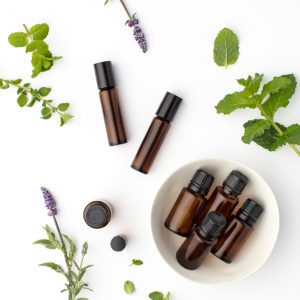
1. Peppermint
Peppermint is a top performing when one has a cold or cough because it contains the sweet aroma of menthol. When you breathe in peppermint oil, it has a cooling effect on your nose and throat which can help relax those muscles while soothing the mucosa. As a bonus, it can also help to relieve headaches. You can put it in a salve, a personal or room diffuser, or smell it straight from the bottle.
Please note that peppermint essential oil should never be used on children under the age of 3 and can be diffused or diluted to less than 0.5% for kiddos ages 3-6. Avoid placing peppermint essential oil directly to your face as it can cause burning to the eyes, nose, and mouth.
2. Eucalyptus
Eucalyptus can refer to 1 of three types of eucalyptus essential oil: Eucalyptus globulus, Eucalyptus radiata, or Eucalyptus citriodora. The last, E. citriodora, is safe to use on and around children 6 months and older. The other two, E. globulus and E. radiata may can be used with caution (per the Tisserand Institute). They put out an update that these can be diffused around babies 6 months and older but should be diluted to 0.5% for babies and toddlers ages 6 months to three years and diluted up to 1% for ages 3-6.
When you breath eucalyptus in, it also helps to dilate (enlarge) the tiny air pathways. The component that requires you to use Eucalyptus with caution, cineole, has antimicrobial effects. This can be used along or in combination with peppermint in a homemade chest rub, diffuser, or roll on blend.
I personally have not used peppermint nor the cineole containing Eucalyptus on my kiddos’s skin under the age of 3 because I didn’t want to risk any burning.
3. Lemon
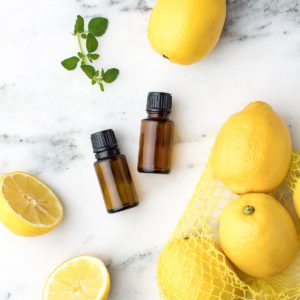
This one might be surprising as lemon is apart of the citrus oils, but lemon oil can help support a healthy immune system and promote lymphatic drainage. Your lymphatic system helps to filter and drain toxins & other waste from your body, which is especially important when we’re sick with a cough or cold.
Lemon essential oil also has antimicrobial properties. This is why you’ll find it in “germ fighter” types of blends. One study even put bacteria onto meat then used lemon essential oil and found that it helped to inhibit the growth of bacteria suggesting that it might be good for the food and pharmaceutical industries. Those of us in the natural realm don’t need to be told this! 😉 You can also check out my previous blog post on lemon essential oil here.
4. Oregano
Now, I’m not talking about oil of oregano (which is pretty awesome too) but oregano essential oil. Oregano possesses both antifungal and antibacterial properties. There’s a reason it’s referred to as a natural antibiotic. It’s also been shown to stop viruses from replicating. A cold or cough can be bacterial or viral, so oregano can be benefited from by diffusing or inhaling by placing it topically on the chest.
5. Rosemary
Rosemary is an essential oil that I don’t feel gets the credit it deserves. Many know rosemary essential oil for its benefits to hair. And, there has been evidence emerging about how these typical culinary herbs are beneficial to our health. Rosemary possesses anti-inflammatory and anti-microbial properties among other things. So it can a supporter of your immune system. One small study used a spray containing peppermint, eucalyptus, oregano, and rosemary oils and found that it helped to decrease respiratory symptoms in 26 people versus the placebo group when applied 5 times per day for 3 days.
Rosemary is not considered safe for young kids and shouldn’t be used in pregnancy.
6. Clove Bud
Clove is in the same family as eucalyptus, although their smells differ greatly! Clove oil smells like it came right from your kitchen cabinet! It is a warming spice that really brings out memories of the holidays! This little oil has anti-fungal and anti-viral properties
Essential Oil Safety and Usage
Remember, although essential oils are fairly safe, they should be used correctly in order for them to be. The Tisserand Institute is one place I’ve gone back to over the years for essential oil safety and education. They also have a book on essential oils and their safety. I also have a post about Using Essential Oils Safely. Please be careful using oils like peppermint or eucalyptus with children and make sure to look them up before using them!
Essential Oil Blends
Remember, each diffuser is going to have a recommendation for the drops of essential oil or oils you use. So tweak these as you need.
Essential oil diffuser blends
Soothing blend
- 2 drops of eucalyptus
- 2 drops of oregano
- 2 drops of peppermint
- 4 drops of lemon
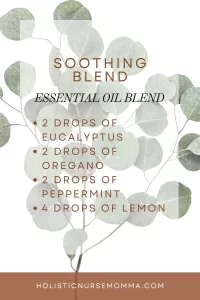
Winter wellness blend
- 2 drops lavender oil
- 2 drops cinnamon oil
- 2 drops clove oil
- 2 drops lemon oil
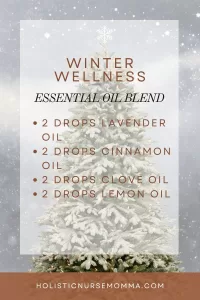
Make your own chest rub
- 2 Tablespoons coconut oil (or other carrier oil)
- 5 drops eucalyptus (use eucalyptus dives for a kid friendly version or swap for fir needle)
- 3 drops lavender
- 3 drops peppermint (for kid friendly use spearmint)
Mix in a glass jar. Do a patch test on your skin to check for any reactions. Use as needed
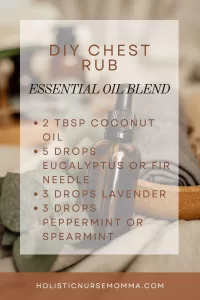
Looking for more natural approaches to a cough, cold, and congestion?
Comment below, I would love to hear from you! Have you ever used essential oils for a cough, cold, or congestion? What was your experience?
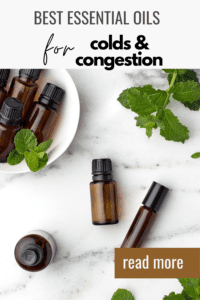
*This post is for educational purposes only. The FDA has no approved these methods and aren’t meant to be used to treat, prevent, or cure anything. I am not a doctor and this post is NOT intended to be used as medical advice.



Leave a Reply